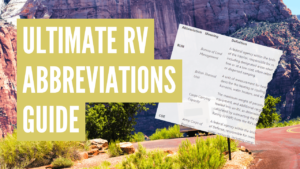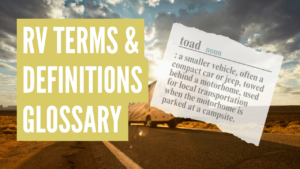Understanding the Gross Trailer Weight Rating (GTWR) is crucial when pulling a trailer down the road.
Let’s explore the meaning of GTWR, how to determine your GTW, and tips to safely and efficiently tow a travel trailer.
What is GTWR
Gross Trailer Weight Rating (GTWR) refers to the highest amount of weight a trailer can safely carry. This weight includes both the trailer itself and any cargo placed inside. The GTW of a trailer is the same as GVW (Gross Vehicle Weight), but it’s specifically directed at a trailer. You’ll typically see GVWR referenced when it comes to towable RVs.

The trailer manufacturer provides this weight rating, which is crucial for determining the compatibility between your tow vehicle and the trailer you plan to tow.
Why is GTWR Important
GTWR is essential for several reasons:
- It ensures the safety of the driver and others on the road
- It prevents damage to the tow vehicle and the trailer
- It helps you comply with legal weight limits and regulations
- It maintains the performance and handling of the tow vehicle and the trailer
Staying within the GTWR/GVWR limits helps prevent accidents, avoid fines, and ensure a smooth towing experience.
How to Determine Your GTW
To determine your Gross Trailer Weight (GTW), you need to weigh your fully loaded trailer without including the weight of your tow vehicle. Follow these steps to accurately determine your GTW:
- Locate a public scale or a weigh station in your area
- Load your trailer with the cargo you plan to carry
- Disconnect your trailer from your tow vehicle
- Ensure that your tow vehicle is off the scale and the trailer is completely on it
- Weigh the fully loaded trailer to get your GTW
Ensure your GTW does not exceed the GTWR/GVWR specified by the trailer manufacturer.
Safety Tips for Towing
1. Know the Weights and Towing Capacity of Your Tow Vehicle and Trailer
Familiarize yourself with the GTWR, Gross Vehicle Weight Rating (GVWR), and Towing Capacity of your tow vehicle and trailer to avoid overloading.
2. Level the Trailer
It’s crucial to keep your load balanced, both front to back and side to side. If your trailer hitch is too high or low for your tongue, you might encounter problems on the road.
3. Make Sure the Trailer is Properly Loaded
Distribute the weight of the cargo evenly, and ensure the tongue weight is between 10% and 15% of the trailer’s total weight.
4. Check Your Brakes
Before hitting the road, ensure the brakes on your tow vehicle and trailer function properly.
5. Check Your Lights
Verify that all trailer lights, including turn signals and brake lights, are working correctly.
6. Check Your Tires
Inspect the tire pressure and condition for your tow vehicle and trailer tires.
7. Final Check Before Hitting the Road
Before starting your journey, ensure the following:
- The hitch ball is securely fastened
- The coupler or socket is locked over the ball with a pin and clip
- Safety chains are attached and secured properly
- Wiring harnesses are correctly attached and functioning properly
Other Important Towing Terms

- GAWR Meaning: GAWR, or Gross Axle Weight Rating, is the maximum allowable weight that can be placed on an axle of a vehicle when fully equipped with passengers, fluids, and payload. The front and rear axles can have a different GAWR.
- GCWR Meaning: GCWR, or Gross Combined Weight Rating, is the maximum allowable combined weight of a towing vehicle (including passengers and cargo) and the towed vehicle (or trailer), including its cargo.
- GVWR Meaning: GVWR, or Gross Vehicle Weight Rating, is the maximum weight an RV or tow vehicle can safely carry, including the vehicle itself, passengers, cargo, and fluids, as determined by the manufacturer.
- Pin Weight Meaning: King Pin Weight, also known as Pin Weight or Fifth Wheel Pin Weight, is the amount of a trailer’s weight that rests on the hitch of a towing vehicle when using a fifth-wheel or gooseneck hitch.
- Tongue Weight Meaning: Tongue Weight is the downward force exerted by the trailer’s coupler onto the hitch ball of the towing vehicle.
Check out our RV Terms & Definitions and RV Abbreviations guides for more terms and their meanings.
Download Our RV Terms & Definitions Guide (With Abbreviations & Slang)

This comprehensive, 17-page printable guide contains the most common terms, abbreviations, and slang used in the RV community! Over 150 essential terms and their meanings, organized alphabetically, that you can access anywhere! Don’t travel without it!







Write a comment